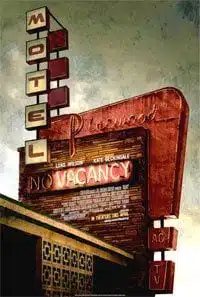
Modern horror seems to have diverged from its roots. While originally focused on scaring the wits out of its viewers any way possible, much of today’s horror achieves this solely through gore. Though violence is not an inferior means to achieve fright – blood, guts and gross-out make-up are almost a requirement now for the genre – and any horrifying film without these components is simply labeled “thriller” (whatever that means).
Nimròd Antal’s Vacancy takes us back to the days of suspense, when the chase was exhilarating on its own and not just the means to a morbid end. Though Vacancy is not a throw-back, suspense before gore is a fresh twist, and allows the film to focus more on the characters and mood. But then again – is that necessarily better?
Luke Wilson and Kate Beckinsale play a husband and wife fractured by long-term miscommunication. Though they attribute much of the marital malady to the death of their child, Antal shows very strongly that these two have always had problems. While taking an “off-the-interstate” shortcut, car trouble forces the Foxes to spend the night at the seediest motel this side of Plant-town. In one of the few two-shots of the couple, Beckinsale’s Amy Fox remarks, “I’m sleeping in my clothes tonight,” to which Wilson’s David responds “I’m sleeping in my shoes.” The disrepair of the motel is one of the only things these two can agree on.
Starved for anything but their own company, David plays some horror films found in the room. Once they notice that these low-budget, snuff films all take place in their motel, the couple realizes the truth and sees the danger they’re in. Soon, they are terrorized by some barely named assailants who seem more interested in scaring them than killing them. Let the chase begin.
Vacancy is very moody and tempo-driven. The elaborate motel set (shown in-creation in the special features) is treated with dignity and respect; though we know the terror will soon come, Antal makes us wait and observe our surroundings before indulging our childish fantasies. Though the second half has a “been-there” feel to it, it’s the beginning scenes before the first attack, including a subtle and harrowing interaction with a car mechanic (Ethan Embry), that cause the most enjoyment.
However throughout the film (especially in the final two acts), there is an over-emphasis on heavily worn horror themes. Claustrophobia, voyeurism, xenophobia are all commonly tread subjects that Vacancy wears even thinner. Humorously, throwing such themes together parallels almost too well the out-of-place scene where Beckinsale confronts her fear of rats – just a mish-mash of overplayed, tried-but-sometimes-true scenarios.
And, quite frankly, the relationship between the Fox family is just subpar – especially considering its large focus in the plot. There should be a new genre for studio horror films called “Complex Relationship Problems Solved by Scary Situations”. Too many feel-good, thrillers-that-want-to-be-horror movies contain the overarching theme of near-death experiences making us realize the fragility of our interconnections. It’s a great, powerful, and subtle message, but one that’s as re-hashed as claustrophobia, voyeurism, and xenophobia combined.
It’s true, life-threatening situations do cause us to reevaluate our priorities, but they don’t serve as a catalyst to resolve all the problems. The Foxes haven’t really changed from the beginning to the end. And even if both people make it out alive (I’ll give you a hint: the budget was $18 million – quite sizable for horror), they can’t just resolve every fight by saying, “Remember that time those guys tried to kill us? Didn’t we work well together?” Deep emotional changes have to occur for people to solve fundamental differences – and “Boo!” coupled with a bloody knife just doesn’t do it believably. This is why the best modern horror films don’t provide truly provocative and engaging relationships outside of the horror – because it just doesn’t work.
Similarly, Danny Boyle has been doing many Sunshine-related interviews lately and a common topic is the narrowness of the space sci-fi genre. There are rules that must be abided by which Boyle only discovered during production. After naming a litany of examples, he admits that he even tried a love scene that was cut because, “sexual relationships just don’t work in space.”
In many ways, modern horror is bound by the same types of restrictions. Horror scenarios can make strong bonds fall apart, or make weaker bonds become stronger – but they cannot reliably make people in divorce proceedings rediscover their love for their spouses. The analogy of psychological epiphany just falls apart too early. Even, arguably, more successful films like The Descent falter when trying to display complex character changes through terror-filled bloodshed.
So what does this all mean for Vacancy? Well, it’s suspenseful and makes you care for the couple, but in a genre not built for intense characterization, the Foxes still come off as only two-dimensional. The pacing is good, but by the end, the film has worn out its scares and the ending is pointlessly optimistic and the weakest part of the film – sadly, you’re left remembering the movie worse than it actually was.
There is, however, a very interesting perk from the DVD. Antal offers full versions of the snuff films shown briefly in the motel room. Though the total running time is under 10 minutes, there is a “beauty”, if you will, in these amateurish killings. Scant blocking and acting relate this scene to a well-budgeted haunted house and its honesty is refreshing. Though obscured by fake static and hastily thrown together, portions of this feature are scarier than the film itself.
